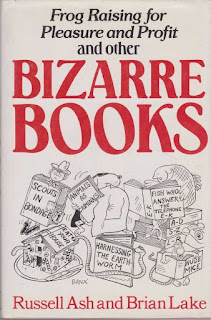Here's another gem (or so I'd like to think) from my archives. This is a book review I had published in the library newsletter, some years ago. It's rather appropriate to the post about books that I put up yesterday.
First, a quick glossary. "IRM" is Information Resource Management, the department of our library that deals with the acquisition and cataloguing of books. (Or rather, that is its former name. Happily, it is now called "Collections" instead.) "RFID" is a form of electronic book tagging which lets books be borrowed and returned using radio frequency. It was a new thing in the library at the time.
The reference to telegraph pole insulators is extra amusing in hindsight, since my current office mate actually collects them, and gave me one for my birthday a few years ago. I didn't know that at the time. I'm not even sure he was working in the library back then.
Nobody in the library even mentioned this article to me. Pearls before swine. (That's a joke.) Maybe my blog readers will be more interested.
I’m
sure it’s happened to everyone who works in a library, at some time or other.
You’re working your way through a trolleyload of books. Maybe your mind isn’t a
hundred per cent on what you’re doing. You pick up a volume. You glance at the
title. Your eyes widen. You flick through the pages, growing more and more
incredulous. Two minutes later, you’re calling to a colleague; “Come here,
you’ve got to see this”. Two more minutes later, you’ve decided that, no
matter how weird or obsure the subject, no matter how far-fetched the theory, somebody
somewhere has written a book about it.
Well,
guess what—somebody has written a book about that, too, and we have it in our
shelves. Bizarre Books by Russell Ash and Brian Lake, published in 1985,
is a celebration of the fact that nobody needs a license (or even an iota of
good sense) to publish.
Double
entendre titles, ridiculous author’s names, far-out subjects, nutty
theories…it’s all here, and as respectably-sourced as anyone could ask for.
You
know those children’s jokes where a book title is paired with a humorously
appropriate author’s name? Well, according to Bizarre Books, truth
really is stranger than fiction. There really is a book called Punishment by
Robin Banks (Penguin, 1972) and another called The Art of Editing by
Floyd K. Baskette and Jack Z. Sissors. There is also a Motorcycling for
Beginners by Geoff Carless. But my favourite in the apt author’s name
category has to be Fuel Oil Viscosity-Temperature Diagram by Guysbert B.
Vroom (1926).
Then
is the J.R. Hartley Award for most obscure book subject. In 1897, the National
Temperance League found the money to publish Octogenarian Teetotalers, with
One Hundred and Thirteen Portraits. It is, as the authors of Bizarre
Books put it, “probably the only illustrated directory of geriatric
abstainers ever published”. (They even reproduce an illustrated double-spread
from this unjustly forgotten work.)
We
also get a picture from Philippe Halsman’s Jump Book, a collection of
photographs showing various celebrated people…jumping. The picture reproduced
shows the Duke and Duchess of Windsor leaping in the air, shoeless and
hand-in-hand, obviously fully recovered from the Abdication Crisis. Apparently
Bertrand Russell refused to jump—but plenty of other notables (including
Salvator Dali) seem to have asked, “How high?”.
There
are other mind-bogglingly specific books—Fifty New Creative Poodle Grooming
Styles and The Influence of Mountains Upon the Development of Human
Intelligence deserve honourable mention. But let us move on to
eyebrow-raising titles. I Was a Kamikaze (1973) definitely begs the
question. Jokes Cracked by Lord Aberdeen (1929) shows a rather
funereal-looking old Scotsman on the cover, and I’m sure many people in IRM
will be keen to learn The Joy of Cataloguing (1981).
(Perhaps
I should mention here that we have a few crackers in our own stock. One of my
favourites is Modern Thinkers on Welfare by George and Page. I was one
of those myself for several months after leaving college.)
But,
just as they say there’s someone out there for everyone, there’s obviously a
reader for every book. As the introduction to Bizarre Books puts it:
“But what is odd? It is quite clear that one person’s bizarre book is another’s
bread and butter. We thought Searching for Railway Telegraph Insulators a
hugely funny and esoteric title until a lecturer in electronics asked where he
could get a copy of this key text.”
Now,
if you excuse me, I have to get back to work on my own magnum opus on the life
of the contemporary library assistant, Me and RFID…





